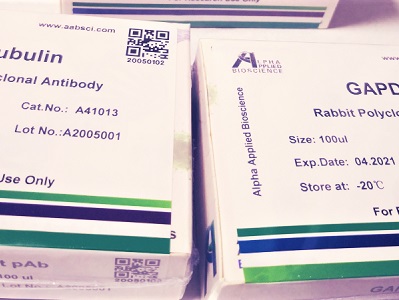

SNUT1 rabbit pAb
Cat :A21711
-
Source
Rabbit
-
Applications
WB,ELISA
-
Reactivity
Human,Mouse,Rat
-
Dilution
WB 1:500-2000 ELISA 1:5000-20000
-
Storage
-20°C/1 year
-
Specificity
SNUT1 Polyclonal Antibody detects endogenous levels of protein.
-
Source/Purification
The antibody was affinity-purified from rabbit antiserum by affinity-chromatography using epitope-specific immunogen.
-
Immunogen
Synthesized peptide derived from part region of human protein
-
Uniprot No
O43290
-
Form
Liquid in PBS containing 50% glycerol, and 0.02% sodium azide.
-
Clonality
Polyclonal
-
Isotype
IgG
-
Background
squamous cell carcinoma antigen recognized by T-cells 1(SART1) Homo sapiens This gene encodes two proteins, the SART1(800) protein expressed in the nucleus of the majority of proliferating cells, and the SART1(259) protein expressed in the cytosol of epithelial cancers. The SART1(259) protein is translated by the mechanism of -1 frameshifting during posttranscriptional regulation; its full-length sequence is not published yet. The two encoded proteins are thought to be involved in the regulation of proliferation. Both proteins have tumor-rejection antigens. The SART1(259) protein possesses tumor epitopes capable of inducing HLA-A2402-restricted cytotoxic T lymphocytes in cancer patients. This SART1(259) antigen may be useful in specific immunotherapy for cancer patients and may serve as a paradigmatic tool for the diagnosis and treatment of patients with atopy. The SART1(259) protein is found to be essential for the recruitment of the tri-snR
-
Other
SART1, U4/U6.U5 tri-snRNP-associated protein 1 (SNU66 homolog) (hSnu66) (Squamous cell carcinoma antigen recognized by T-cells 1) (SART-1) (hSART-1) (U4/U6.U5 tri-snRNP-associated 110 kDa protein) (allergen Hom s 1)
-
Concentration
1 mg/ml
| Product | Reactivity | Applications | Conjugation | Catalog | Images |
|---|
-
 400-836-3211
400-836-3211
-
 support@aabsci.com
support@aabsci.com
-
β-actin rabbit pAb ...... >
-
β-actin rabbit pAb(A284) ...... >
-
Plant-actin rabbit pAb ...... >
-
β-tubulin mouse mAb(M7) ...... >
-
GAPDH mouse mAb(2B8) ...... >
-
GAPDH mouse mAb(PT0325) ...... >
-
Histone H3 rabbit pAb ...... >
-
Histone H3 rabbit pAb ...... >
-
COX IV mouse mAb(6C8) ...... >
-
GFP-Tag mouse mAb(1G6) ...... >
-
HA-Tag mouse mAb(1B10) ...... >
-
mCherry-Tag mouse mAb(6B3) ...... >










 400-836-3211
400-836-3211
